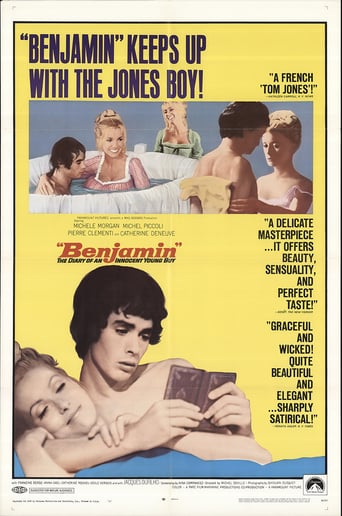Ersbel Oraph
The script is of very low quality. The acting is provincial. The costumes are of a lower quality than for a television drama. Fact checking is non existent. It might as well been set on the fictional world of Dune. But I don't feel like any of the famous French script writers has the skill and quality of somebody like Frank Herbert. So this last comparison is quite unfair when the best of the best in the French movie industry means a shallow love story weeded by biographical bits from the life of the writer. The dialogue is weak and stereotype.Than what makes this piece of junk hilarious? The nerve of French intellectuals of laughing at Star Wars or XMen which still have more artistic value.Contact me with Questions, Comments or Suggestions ryitfork @ bitmail.ch
lor_
Not among French director Michel Deville's finest achievements BENJAMIN remains what Graham Greene used to call (not derisively) "an entertainment" -quality for the mainstream moviegoer. Through the vagaries of film distribution (and flighty popular tastes) it has fallen into obscurity.As indicated in its English title, film is bookended by passages read from the title hero's diary. As played by Pierre Clémenti (an icon of European decadent & avant garde cinema, here cast against type as an innocent), he's an orphan going with his loyal tutor Camille (Jacques Dufilho) to live with his aunt, the countess (radiant superstar of the '40s Michèle Morgan).His adventures with the aristocracy are limned in the familiar "naughty but nice" style that served French cinema so well, most emblematically in many Fernandel comedies. Deville and his frequent collaborator, screenwriter & future helmer Nina Companeez, maintain a light and breezy approach that, alas, lacks the substance most film buffs want today.It's all tease, as women of all ages, having in common uncommon beauty, can't keep their hands off Benjamin. The film was a major Paramount release, debuting in NYC at the prestigious Paris Theatre and rated X (a MIDNIGHT COWBOY-type X, not porn) for its sexual attitudes rather than any explicitness. The nudity common in Adult Cinema at the time is eschewed.Standout performances are by Michel Piccoli, perfectly cast as the countess's lover, who boasts about his other mistresses and is sympathetic due to the actor's skills more than the writing or context. With so many fancily costumed and straining-at-bodice femmes in the cast Catherine Deneuve has no trouble standing out as Benjamin's ultimate love interest. Especially fun is her character's flightiness, given always witty lines as an invariable liar who makes sport of her constantly contradictory statements.Clémenti is less successful in the central role, at times fading into the shrubbery with such striking and bombastic co-stars pleasantly chewing up the scenery. Having already co-starred opposite Deneuve in her triumphant BELLE DE JOUR, he was better suited to decadent or even malevolent roles with the good fortune to be cast over and over again by the leading directors of the time: Bertolucci, Pasolini, Bunuel, Jancso, Makavejev and Glauber Rocha {reads like a film festival program of the late '60s}.Other delights include an amusing wardrobe malfunction at a garden party scene, where the countess's sort-of-loyal servant Anna Gael accidentally has a nipple popping out of her dress, but calmly adjusts her bodice without missing a beat, the take playing out and left in the final print -very cute. Catherine Rouvel, a stalwart of French eroticism, is unfortunately lost in the shuffle as another servant girl.Piccoli sums up the tone with a great line (in the English-dubbed version at any rate) to Benjamin: "What you call debauchery I call education". Lacking the depth of his all-time best role in Rivette's LA BELLE NOISEUESE, BENJAMIN does stand as testament to Piccoli's place in history as one of cinema's essential thesps.I waited over 40 years to see BENJAMIN, so was of course slightly disappointed by its lack of substance -got my hopes up too much. The Hollywood majors relied heavily in the '60s on foreign imports, both co-productions and pickups, to fill out their release schedules, but rights in these movies (as well as residual interest) have lapsed over the years. That's why a quality film like BENJAMIN has seen no American TV or video exposure since its initial release.English-language print I viewed (via VSOM DVD) ran 103 minutes, contrary to the IMDb listing of a much shorter U.S. running time.
Aulic Exclusiva
There is a very French economy in the story-telling here: how a young man loses his virginity. An experience that we all recognise, simply told. The park at the château Hennessy in Cognac is evocatively photographed, giving that sense of the idealised, lost manor, that the French love so much. (Alain-Fournier wrote a very pretty novel about that)Pierre Clementi and Catherine Deneuve, two VERY decorative figures, are loved by the camera; their climactic, moon-lit encounter is wistfully nostalgic of the '60s, when taking off your clothes was An Event. Mme Morgan is the very embodiment of A Presence.Now that châteaux are invariably conference centers for greasy-haired accountants, now that all Presences have left us for ever, now that we have taken off our clothes just about a million times, this simple film is surprisingly moving.



